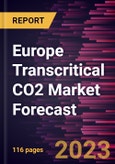Adoption of Transcritical CO2 Systems in Supermarkets and Convenience Stores Fuels the Europe Transcritical CO2 Market
Supermarkets and convenience stores often face consumer scrutiny regarding their environmental impact and sustainability practices. Adopting transcritical CO2 systems allows retailers to showcase their commitment to sustainability and environmental responsibility, improving their brand image and attracting eco-conscious consumers. Consumer demand for environmentally friendly products and services has been increasing, and retailers that embrace transcritical CO2 systems can differentiate themselves in the market and gain a competitive advantage. Moreover, transcritical CO2 systems offer operational flexibility and adaptability to varying ambient conditions. They can effectively operate in both subcritical and transcritical modes, allowing for optimal performance in different climates. The transcritical CO2 system design can be tailored to meet the specific needs of supermarkets and convenience stores, such as different refrigeration loads, store layouts, and product display requirements. The flexibility and customization options of transcritical CO2 systems make them suitable for these retail environments. Thus, all such advantages of transcritical CO2 systems are driving the market further.Europe Transcritical CO2 Market Overview
The transcritical CO2 system market in Europe is segmented into Germany, France, Italy, the UK, Russia, and the Rest of Europe. In Europe, transcritical CO2 systems have gained a lot of attention due to their energy efficiency and environmental benefits. These systems use carbon dioxide as the refrigerant instead of the conventional hydrofluorocarbon (HFC) refrigerants with a high potential for global warming. It can be used for transport refrigeration, industrial refrigeration, heat pumps, supermarkets, convenience stores, and other commercial and industrial refrigeration applications. The transcritical CO2 system has a lower critical temperature than conventional refrigerants. Also, it is not toxic, flammable, and chlorinated. These systems have a negligible potential for ozone depletion, negligible global warming, and low leak rates.In 2022, the European Commission proposed two new Regulations to strictly control the use of fluorinated greenhouse gases (F-gases) and ozone-depleting substances (ODS). The implementation of these measures would be a major step toward controlling the increase in regional temperatures in accordance with the Paris Agreement. The use of F-gas will also help Europe reduce greenhouse emissions by at least 55% by 2030 to achieve climate neutrality by 2050. By 2050, the combined effects of both ideas might reduce greenhouse gas emissions in the EU by 490 Mt (CO2 equivalent). Due to the F-Gas laws and HFC phase-out plan, the transcritical CO2 system market in Europe may have considerable growth. Additionally, the region has the greatest number of end-users organizations, including Tesco and Metro AG, that switched to refrigeration systems based on transcritical CO2 systems.
The effect of the COVID-19 pandemic, including the lack of truck drivers, border closures, and quarantine requirements, disrupted the supply chain in Europe. Thus, companies could not maintain product's shelf life, and hence the focus shifted to implementing cold storage in the system. According to the European Cold Storage & Logistics Association (ECSLA), Europe has thousands of cold storage units with a capacity of more than 60,000 m3 of commodities cold storage throughout Europe. In Europe, ECSLA manages the current cold storage capacity and its expansion. Thus, the rising number of cold storages increases the demand for transcritical CO2 systems, which will boost the market growth in the coming years.
Europe Transcritical CO2 Market Revenue and Forecast to 2030 (US$ Million)
Europe Transcritical CO2 Market Segmentation
The Europe transcritical CO2 market is segmented into application, function, and country.Based on application, the Europe transcritical CO2 market is segmented into ice skating rinks, food processing & storage facilities, heat pumps, supermarkets & convenience stores, and others. The supermarkets and convenience stores segment held the largest share of the Europe transcritical CO2 market in 2023.
Based on function, the Europe transcritical CO2 market is segmented into air conditioning, refrigeration, and heating. The refrigeration segment held the largest share of the Europe transcritical CO2 market in 2023.
Based on country, the Europe transcritical CO2 market is segmented int o the Germany, France, Italy, the UK, Russia, and the Rest of Europe. France dominated the Europe transcritical CO2 market in 2023.
TEKO Gesellschaft fur Kaltetechnik mbH, Baltimore Aircoil Co, BITZER Kuhlmaschinenbau GmbH, Carrier Global Corp, Danfoss AS, Emerson Electric Co, Panasonic Holdings Corp, and Mayekawa Manufacturing Co Ltd are some of the leading companies operating in the Europe transcritical CO2 market.
Reasons to Buy
- Save and reduce time carrying out entry-level research by identifying the growth, size, leading players, and segments in the Europe transcritical CO2 market.
- Highlights key business priorities in order to assist companies to realign their business strategies.
- The key findings and recommendations highlight crucial progressive industry trends in Europe transcritical CO2 market, thereby allowing players across the value chain to develop effective long-term strategies.
- Develop/modify business expansion plans by using substantial growth offering developed and emerging markets.
- Scrutinize in-depth Europe market trends and outlook coupled with the factors driving the market, as well as those hindering it.
- Enhance the decision-making process by understanding the strategies that underpin security interest with respect to client products, segmentation, pricing and distribution.
Table of Contents
Companies Mentioned
- Baltimore Aircoil Co
- BITZER Kuhlmaschinenbau GmbH
- Carrier Global Corp
- Danfoss AS
- Emerson Electric Co
- Mayekawa Manufacturing Co Ltd
- Panasonic Holdings Corp
- TEKO Gesellschaft für Kältetechnik mbH








